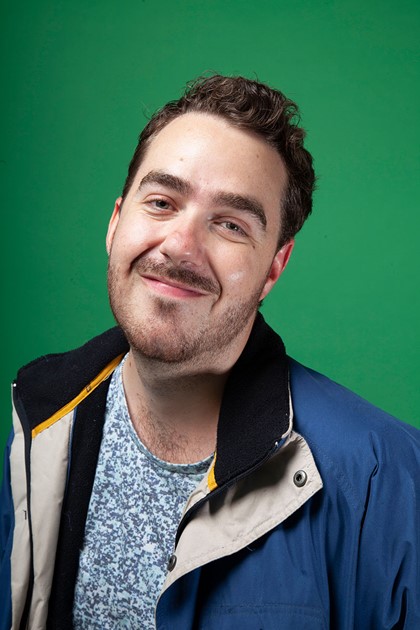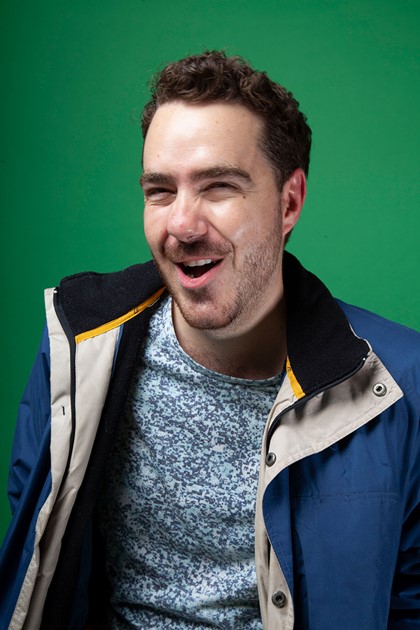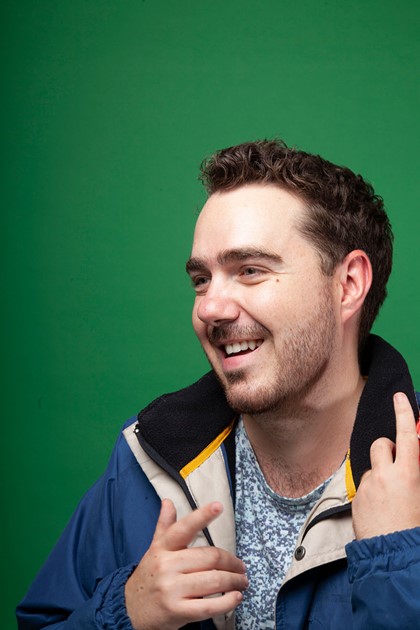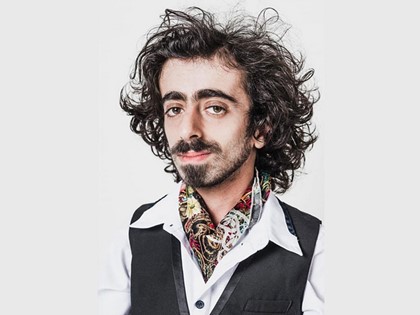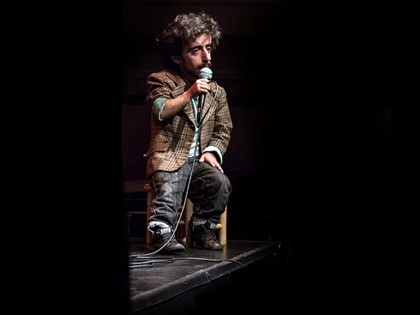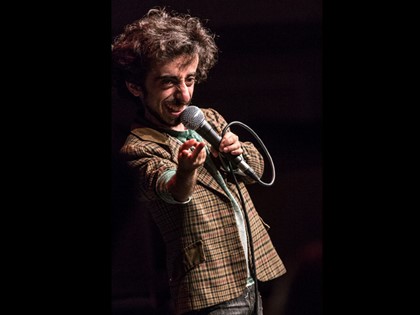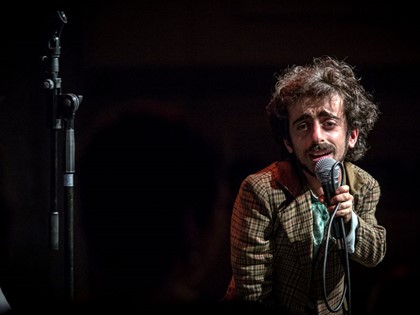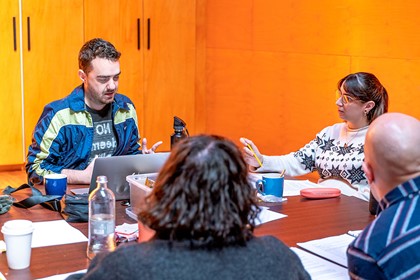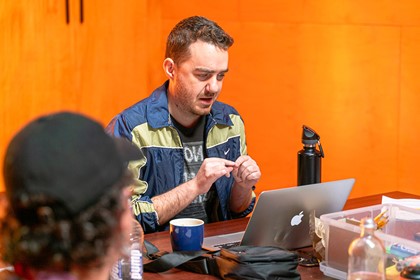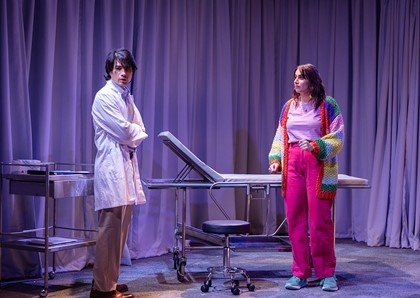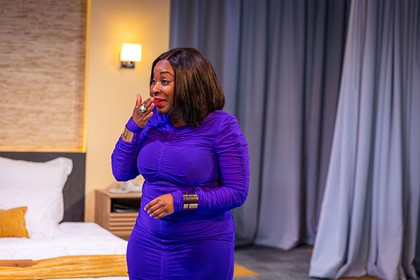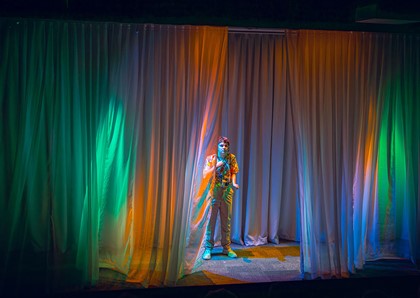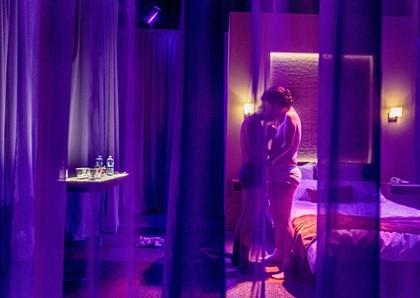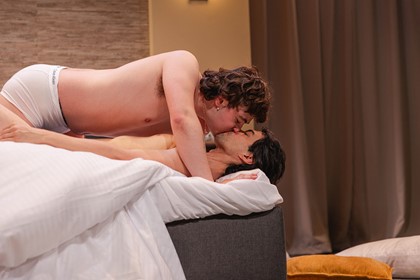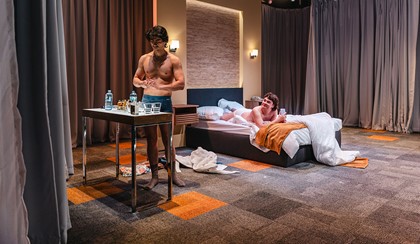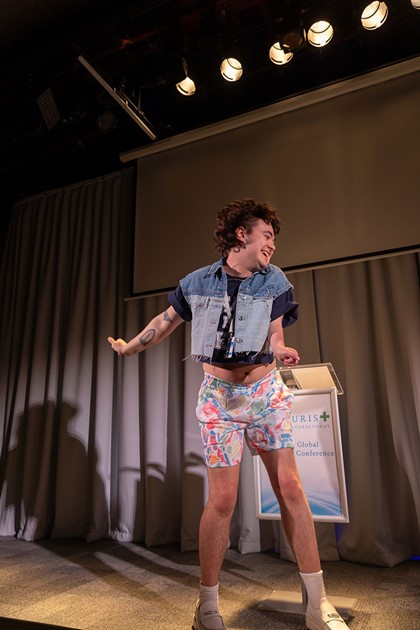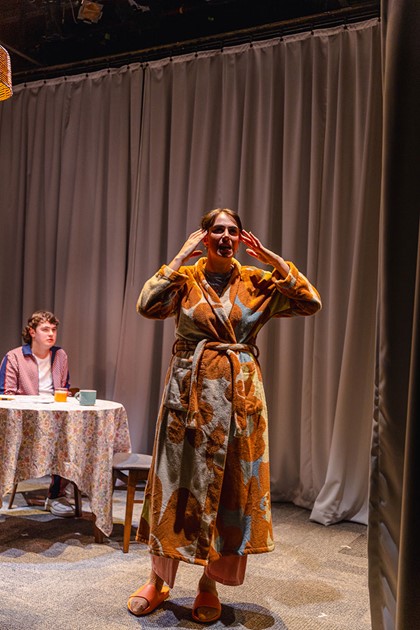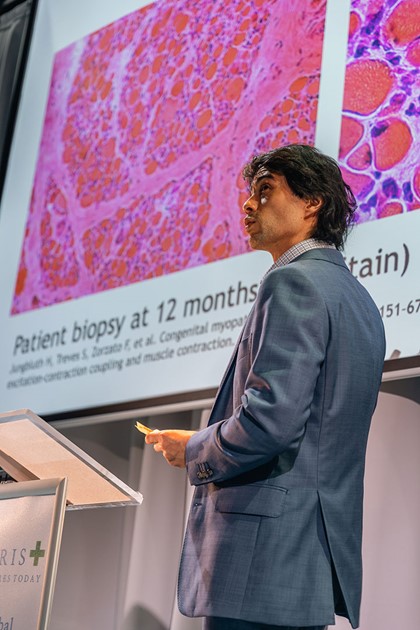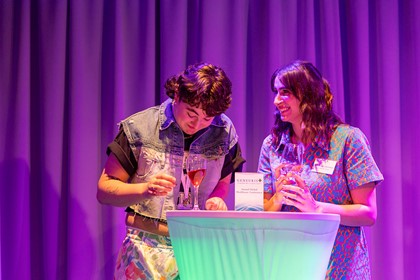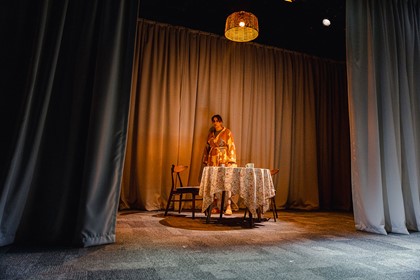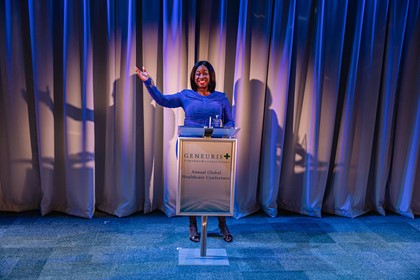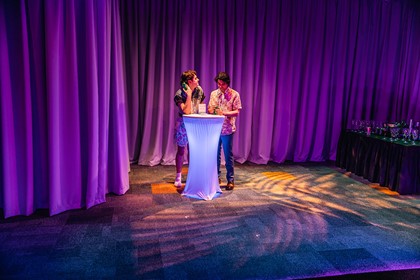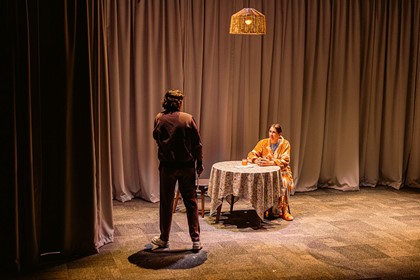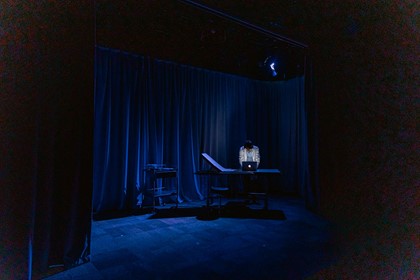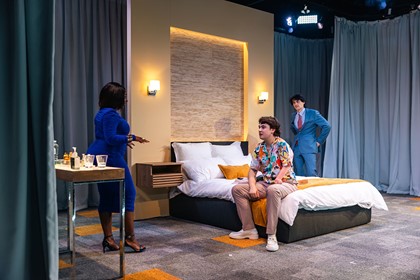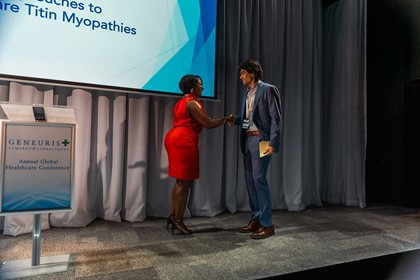Imaan
I really enjoyed reading the script. I mean, it has you all over it.
Alistair
Oh, yeah. You got the print copy with all my DNA over it.
Imaan
Yes, it’s quite good. Was your doctor sexy? That’s the first question I want to ask you.
Alistair
Was my paediatric neurologist sexy? Well, not to me, because she was a woman, but I think I did have a lot of himbo physiotherapists as a kid too, coming in with like the theraband and teaching you stretches, like hunky dudes with nothing much going on inside. And at those formative ages, you know, they probably turned me gay.
But what about you?
Imaan
I only had a sexy nurse once when I was 13. Everything was sexy then.
Alistair
A tree with the right curve in its trunk is sexy at that age.
Imaan
But my geneticist, she was an awesome lady. She still is, but she looked like a McGonagall, you know. Stern. Anyway. When did you write this? When did you have the time to? You’re always creating something man.
Alistair
I started this in 2020 for this MTC program Cybec Electric, so I wrote the first 20 minutes of it and it was called Celebrity Skin. And it was a much smaller version, just Sam and Doc and a lot of their conversations that happen in the hotel room. Then Melbourne shut down and I lost any ability to work on it at all. So yeah, just like a huge two year break, right in the middle of the process where I was sad and bleaching my hair.
Imaan
You bleached your hair?
Alistair
At a low point during lockdown. I bleached my hair out of solidarity with the Great Barrier Reef.
Imaan
I did the weird thing where I shaved my belly, just to see how long it would take to grow back.
Alistair
How long did it take?
Imaan
A month and a half. That was out of solidarity with deforestation.
Theatre and stand up are very similar in that there’s an instant reaction with the audience, is it hard to predict that without trialling it at an open mic?
Alistair
It's been the hardest to work on because I am drawn to getting that feedback. I don't know if you relate to this—but sometimes I have so little faith in abled people's ability to laugh at the correct things, and they'll either be too sensitive or stuff will go over their heads.
Imaan
Or they laugh too hard.
Alistair
Definitely yeah, it's a pendulum swing in either direction. They'll either be like, this is too far, or they’ll laugh at the wrong bits too hard. At Malthouse there were two workshops with actors before we started rehearsals which were really good because it was a fresh audience. I guess I'm the kind of writer that uses acting workshops as writers rooms basically, where I fine tune the comedy and the narrative, and I get actors to be like, does this make sense?
Imaan
Yeah, it's important for them to get it.
Alistair
I find some of the best acting occurs when the actor does in fact get the script.
The line between stand up and theatre and generic fringe, one hour performance is very small. But have you done much theatre or writing for other performers?
Imaan
I've never written for another voice except my own.
Alistair
And why would you? I want to write for your voice too. It's a good voice.
Imaan
Something I've been confronted with lately in the comedy scene is that I do find myself constantly writing jokes that are based on my disability, and it's really difficult to shake it. But then again, I'm talking through my voice. Do you have the same pressure to stay within what you know, or do you want to one day branch out and, you know, talk about aliens or whatever?
Alistair
It’s tough because it is the unique selling point in a way. It’s weird because even when I write stuff that's not strictly interrogating ideas around disability, I'll write a few roles as being disabled so that my friends will be cast and it changes everything about the concept just by having a different, like not neutral character. But it's interesting, I've been doing so much publicity for this play and one of the questions I got was, ‘what's the importance of disability rep on stage?’ And I was talking about how I want disabled actors to get paid and have roles where they can be paid. But then I was also like, I think we're more interesting. Playwrights will only start getting into meaty themes of mortality and legacy and agency in middle age, but I did a speed run of that at 10. So why wouldn't I lean into that unique selling point? But in a meta way, the play is about someone who is trapped by being told from a very young age that they're very one of kind and singular. And so their adulthood is similarly defined by this thing that makes them different and if they perform that well enough, people will care more what they have to say.
Imaan
So you need the foundation of that to be able to write it.
Alistair
One of the main discussions in the play is the idea that John Langdon Down didn't have Down syndrome. James Parkinson didn't have Parkinson’s. And your specific experience is so unique within the convention of naming, to be one of two people in the world with Rima Syndrome.
Imaan
And I think the difference with Down syndrome and Parkinson's compared to Rima Syndrome is that you need some tests to diagnose. Whereas with Rima Syndrome, it was just a glance.
Alistair
Yeah, it's like the moment of birth is when the idea of the disease starts existing. So it’s kind of a first dibs thing, but then it’s so funny saying that your disease is your older sister’s.
Imaan
Which I'm so glad about really.
Alistair
Would you have preferred Hadchiti syndrome? Genuinely, I have been so curious about this.
Imaan
You know what? Not really. Because then my dad would feel like he owns it.
Alistair
That’s such a good point actually.
Imaan
No, I think Rima Syndrome is good because Rima went through the hardest part of it. She was poked and prodded because they thought she was malnutritioned for ages. They went all over Europe from one quack doctor to another. And then it took Doctor Zacharin from the Royal Children’s Hospital in Melbourne to go to my mum and dad and say ‘Look at your daughter. She's happy. She's eating, she's shitting, she's hitting all the marks. She's just not growing. She's fine.’
Alistair
What a good doctor.
Imaan
Yeah, she's great. Professor Margaret R Zacharin. She's the best, and she spent six months of the year going to India giving free health care, and then the rest of it at the Children’s Hospital.
Alistair
Fabulous. Is this your Professor McGonagall geneticist?
Imaan
Yes. She had one long braid from her head to her ankle.
Alistair
I feel like I should shout out my neurologist, Dr. Nagarajan, from Perth's Princess Margaret Hospital. A woman, so I was never attracted to her, but she was really good at medicine and being a doctor, which is more important—not for playwriting, but yeah.
I feel like my condition is weird because out the gate they knew I had some kind of muscle disease, but it was unclear what it was. So, I was constantly holding different possibilities in my head during childhood. I wasn't confirmed dying, but I wasn't confirmed not dying. I wasn't confirmed going to need a wheelchair, but some doctors did pitch that, and I was delayed walking. The weird thing with a very one-of-a-kind syndrome is that there's no template ahead of you. But the weird thing is that I actually think the character that I might most be like, in terms of temperament, is maybe Doc.
Imaan
Yeah, I was about to say that Doc is the one with the most broad view of everything.
Alistair
Yeah. And always questioning his own thought process, which is so writer to me, being like ‘am I thinking this because society has conditioned me to?’
Imaan
I really love the interaction where Sam is like, ‘don’t I get to choose when I'm the victim?’ That was powerful because when I read that, all I could think was, oh Sam is being a little bit of a predator. He's been horny all this time and finally he's got the upper hand, and he's manipulated him far more than Doc wants to admit that someone with a muscle problem was able to.
Alistair
It's so interesting working with abled people on this because, for them, it was just so apparent that Doc always had the upper hand. But to me, Sam has the upper hand, it’s just the baggage that people are bringing to the dynamic.
Imaan
I personally think that Sam realized he was in this box and was like, how am I going to have some agency living in this box? So, the confidence comes, the self-assured sexuality comes, and also—Sam's not risking anything. Sam doesn't have much morality, in my opinion, because he questions Doc's deal and then goes on and becomes a spokesperson for the same company.
Alistair
Yeah, Sam is very shoot-from-the-hip and a bit selfish, but also he's got less time. So why fuck about? I think all good love stories have two characters who need to be more like each other. And as they grow closer, they nurture the part of themselves that’s released by this person. They're sort of supplying something that they're lacking. Neither of these guys have proper work/life balance, and I do think they really like each other, but they both exist in a system which isolates people from community and can make people feel very alone and separate and have no social life. And we applaud doctors who are so self-sacrificing. So they might genuinely really like each other, but also I don't think they really know that many people. It's sort of like a first love thing where you don't really have a point of comparison.
Imaan
Your brain is going to trick you into thinking – well, this person is giving me the most attention.
Alistair
I think a big part of the play is about someone who is using sex and loves sex because it's a way to redefine their body in the eyes of who previously only saw them as a sick kid. That's their way of being an adult. ‘My body produces pleasure, not just pain.’ Like, I certainly know I love to slut around and I'm sure there's a wanky part of me that could justify it as some kind of disability activist thing. What's your relationship to that?
Imaan
Well, I've got a little bit of a reputation for being a big old flirt, and I just can't help myself. It's part of the charm.
But the thing I've always struggled with, because of my stature and the whole you, you know, women's desire to have a taller man, and after sex just swimming in the man's shirt. I’ve actually bought a shirt that's too big for me.
Alistair
So you can have the romcom movie moment of the tastefully unbuttoned shirt, both hands holding a mug of coffee. I know exactly what you're evoking.
Imaan
Yeah. And I always feel because of that, whenever I get any interest—that's sexier than who they are and what they do.
Alistair
Yeah, just to be desired is a turn on.
Imaan
Yes, exactly. Because they were able to see, you know, the high cheekbones instead of the low stature.
Alistair
I mean, gorgeous cheekbones. They pop on zoom, I'll tell you that much.
Imaan
Thanks babe.
Alistair
It’s also a green flag. I think abled people have this idea that an abled person having sex with a disabled person is this weird power thing where they take advantage. I'm like, no, it actually speaks highly of the abled person who's attracted to the disabled person.
Imaan
That’s the weird thing with society now is that sex is something that's done to you. Which is a horrible way to think about it because it's something that’s shared. It’s just as rewarding as a great conversation. And a great conversation has to be two ways, you know? So it's really annoying.
Alistair
And the question of who gets to decide? Who is the victim? It’s a weird thing of like… how do you fit?
Imaan
It's the thing about the system and society and the whole vibe. It takes into account too many points of view. You can only know how you stand with the other person.
Alistair
A million percent. That's what I find the tragedy of this play is that when it’s just Sam and Doc, it's perfect. And when they're in this society of two, it works and they are having this like back and forth where they are genuinely learning from each other and delighted in a true meeting of the minds. But then as soon as it's extrapolated out and Doc’s like, how will this look for me? Then it becomes about the optics of it, and it’s ruined.
Imaan
Is that KT's role in the show? As the grounder, who’s like—this is the reality of the situation. Money is power. Let's not forget this.
Alistair
Well, this is the thing. It was really important for me to have someone who is purely pragmatic, because Sam is motivated by a lot of selfish things and Doc is weirdly beholden to this virtue ethics methodology of medicine and whatever. So it was important for me to have someone who's like, okay, it's a numbers game. And the truth is that like money buys needles and vaccines, and it’s so connected to the Telethon thing where the idea of a Telethon is really gross, but it's the only way to get abled people to cough up the money we need to develop stuff. So yeah, put on a little song and dance and look sad on camera.
Imaan
Like ‘I know you had a good year so far, but remember kids and cancer!’
Alistair
As much as this play is inspired by me growing up with a genetic disorder, it's also inspired by working in the entertainment industry and how so much of working in the arts is just, how do you get people to care enough to give you money? And it is always this battle between the ideal version of something and then the weird, compromised, commercially viable version.
Imaan
It's a dangerous line because that's the question with funding. They ask if it's commercially viable and it's like… well, if it was commercially viable—I wouldn't need the funding.
Alistair
Shouldn't the priority for funding go to things that have no commercial viability that will die without it?
Imaan
I feel with the new cycle of funding that disability is almost the flavour of the month. And how do we stay relevant without changing our minority, you know?
Alistair
It's such a good point. I think the interesting thing about disability as a minority is that it's kind of the only one that you can become. So it feels so flavour of the month, but also I'm like, how much of that is just because lockdown gave abled people their first dance with not being able to leave the house when they wanted to, or having to care what medical funding was, or having to worry about whether their doctors were going to bump them down on the list of who gets priority ventilator in the ICU. It’s like even when abled people care, a lot of the time it’s through a lens of like, what if this happened to me?
Imaan
I don't know if you get this in your shows, but I get random people coming in going, ‘Hey, loved your act. You know, my third cousin's a little person.’
Alistair
All the time.
Imaan
I do a lot of crowd work with stand up and I’ll ask, you know, what do you do? And I get a lot of NDIS workers and people start clapping, Oh, that's a carer. And I'm like, no, hang on. That’s just someone that’s being paid to be nice. Like, let's be real here.
Alistair
This is the thing. It’s one of my priorities with the play, that there's this idea of what a doctor is, which is a very nice person. But what I constantly think about is—someone had to graduate lowest in their class at med school. We assume that doctors are smarter than us. But I don't know. Some of the people I went to high school with who are now doctors, I'm like, you just had the patience to do so many years of schooling, but I wouldn't describe you as smarter than me. It’s also a job where you get a fancy title, and lots of money. That's really attractive to sociopaths.
Imaan
Do you think Sam is a sociopath?
Alistair
Maybe. Sometimes I wonder, if I'd been born abled, whether I would have just had Munchausen Syndrome anyway for the attention.
Imaan
It's something I think as well.
Alistair
I'm like, what would our gimmicks be? Yours would probably be, if you were abled, doing stand-up about how your sister has Rima Syndrome. Can you imagine? You become that insufferable relative to a disabled person.
Imaan
Oh my god, I'd be everything I hate.
Alistair
You'd be like, ‘I'm actually doing a lot of caring for my nephew as well.’
Imaan
And I’d have a Netflix special by now.
Alistair
And you wouldn't be interviewing for some theatre.
Imaan
But I wouldn't be the flavour of the month.
Alistair
And we probably wouldn't be friends.
Imaan
Well, if I wasn't short, I might have been gay.
Alistair
That's true. Life has a way of balancing out.
Imaan
I can't wait to see the play. I didn't realize how you're so prolific, man. I think the thing I applaud most is that you were able to submit yourself behind the scenes. It takes a lot to be a person of difference. And writing without the pressure of performing.
Alistair
I think I'm a far better writer than I am a performer. And I'm an okay performer, but to give these words to William Rees as Sam Harmer is far better and far more compelling. And writing is also just my favourite, like I'm already writing the next thing, you know?
I also think maybe people take me more seriously because I have also written for abled people. You know what I mean? The first person I wrote for was Charlie Pickering, who's one of the most able-bodied people you’ll ever meet. But I've done ghost writing in general, and I think there's something liberating because you can just say stuff. Whereas when I write jokes for myself, for stand up, it’s hugely about disability—I feel like I need to make a joke about it up top just so everyone relaxes.
Imaan
Yeah, I hate that.
Alistair
They're waiting for it because your existence is the set up. They just need you to say a punch line.
I’ve got to say, man, I appreciate you in the world of Australian writing. You're a little bit of a pioneer for people with disability in that world of, you know, dark comedy vibes. I'm going to gush, I'm going to thank you.
Alistair
All it takes is to still be white and still be able to walk. You don't really have to structurally change too much. And people can sort of imagine me being their nephew, so they care a little bit more.
Imaan
I appreciate you're using your privilege for good. Let’s put it that way.
Alistair
I'm so glad we had this chat.
Imaan
Me too. Hats off to you.
Standing at just 3.5 ft, Imaan Hadchiti holds a Guinness World Record, for 'The Worlds Shortest (full- time) Comedian'; finally, all of his hard work of breathing and continuing to exist has paid off. But that is all secondary information Frank has forged himself as an Internationally renowned comedian. With over 15+ years of performing and 5 continents later, Imaan has had repeat sell out shows at Edinburgh, Perth and Adelaide Fringes & Touring Asia and Melbourne International Comedy Festivals. He has also graced the stages of Glastonbury and Woodford music festivals in a cabaret capacity.
As a shameless, self promoting, independent artist, there is an obligation to mention that in his career he has performed festivals all around the world and graced the Italian Award winning Cult Hit TV show ‘Battute’ on RAI 2 (2019). As seen on 'THOR: Love and Thunder', 'You Can't Ask That’ ABC, ‘Balls of Steel’ Comedy Central, ‘Wilfred’ SBS TV, 'The Morning After’ NBC, ‘Battute’ RAI 2.
Alistair Baldwin is a TV writer, director, playwright & comedian. In 2017 he completed a Bachelor in Screenwriting (Honours) at the Victorian College of the Arts. His TV writing credits include The Weekly, Hard Quiz, At Home Alone Togetherand Get Krack!n (which he also stars in as ‘Matthew the PA’). Alistair served as Head Writer for Live & Proud! (the official global broadcast of the Sydney WorldPride Opening Concert) and ABC’s ReFrame (a 60 minute TV special marking International Day Of People With Disability, which he also hosted). He is one of eight writers penning standalone episodes for the upcoming SBS anthology series Erotic Stories.
Alistair has provided narrative development services across a number of projects, including Amazon Original series Deadloch, Stan Original series Year Of and SBS Digital Original Latecomers. In 2022 Alistair also made his directorial debut on Latecomers (working closely with set-up director Madeleine Gottlieb before directing the show’s second episode). Latecomers screened at Series Mania in Lille, France, and won the Screen Diversity & Inclusion Network Award at the 2023 SPA Awards.
